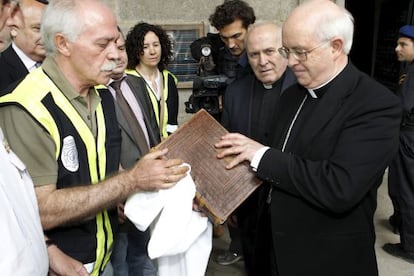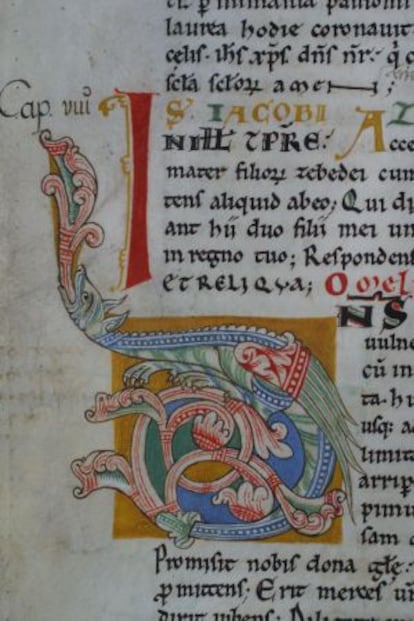Priceless stolen 12th-century Codex Calixtinus turns up in Galician garage
Former employee of Santiago cathedral was keeping haul of valuable books and 1.2 million euros in cash


Criminal investigations move in mysterious ways. One year ago on Wednesday, an invaluable 12th-century religious manuscript disappeared from a safe at the world-famous cathedral at Santiago de Compostela, where security measures turned out to have been extremely slack.
On Tuesday, the eve of the anniversary of the crime, the Codex Calixtinus was found in the garage of a former cathedral employee. José Manuel Fernández Castiñeiras, a 60-year-old electrician who carried out several jobs at the cathedral, was arrested late on Tuesday with his wife, his son and the girlfriend of the latter under suspicion of stealing the Codex Calixtinus, which was written in the mid-1100s and is, according to experts, of incalculable value. The illuminated manuscript was located the next day.
The Codex contains liturgies, reports of miracles performed by Saint James and his subsequent burial in Galicia, as well as the history of Charlemagne and the Way of Saint James through northern Spain — considered the world’s first tourist guide.

The ancient book was said to be in good condition when it was recovered, despite having been stored among old newspapers in a plastic bag nestling between other objects inside a box.
Castiñeiras had worked at the cathedral for 25 years in a self-employed capacity and was sacked after falsifying a labor document to present himself as a contracted worker. He later filed a claim for 40,000 euros for unfair dismissal.
When the Codex was stolen an inside job of some nature was suspected as only three people had access to the book, cathedral deacon José María Díaz said after the robbery. The keys to the safe where the Codex was kept were found dangling in the lock when the theft was discovered.
Sources close to the investigation say the police had been monitoring telephone conversations prior to the swoop.
Castiñeiras appears to have been pilfering from the Compostela cathedral over a lengthy period of time, with police yesterday turning up a large sum of money, as well as other valuable manuscripts and papers among the garage trove.
Castiñeiras, who lives in O Milladoiro, just three kilometers from Santiago, had shown considerable sang froid in continuing to attend mass at the cathedral and spending his mornings in the bars in its environs, musing with former colleagues over the fate and whereabouts of the manuscript. The electrician maintained close ties with many at the cathedral but distanced himself from the priests and, in particular, Díaz.
The large sum of money discovered is thought to have come in part from the cathedral’s collection box
During searches of houses, garages and storage units connected to the four detainees in Santiago, O Milladoiro, Negreira and O Grove, the police uncovered 1.2 million euros in cash, several books belonging to the cathedral and eight photocopies of the Codex. Among the haul was an example of the Book of Hours, a late-Middle Ages manuscript, the disappearance of which had also been reported by the dean. The large sum of money discovered is thought to have come in part from the cathedral’s collection box.
Díaz, the chief lightning rod for Castiñeiras’ wrath, said a month ago that the question was “not to find the thief, but to find the book,” causing consternation among investigators. However, Castiñeiras’ personal enmity toward Díaz marked him out as a suspect from the beginning.
The police had been tracking Castiñeiras’ movements for some time, working on the assumption that the theft had been motivated by personal revenge and not financial gain. A book such as the Codex, experts pointed out, is so unique as to be virtually impossible to sell. Finally, exactly a year after the book was stolen, Judge Vázquez Taín issued a warrant for the arrest of Castiñeiras, as the intellectual author of the crime, and his three family members as accomplices.
Dean Díaz declined to comment on the case on Wednesday, limiting himself to stating that he had received “instructions” to remain silent.
Tu suscripción se está usando en otro dispositivo
¿Quieres añadir otro usuario a tu suscripción?
Si continúas leyendo en este dispositivo, no se podrá leer en el otro.
FlechaTu suscripción se está usando en otro dispositivo y solo puedes acceder a EL PAÍS desde un dispositivo a la vez.
Si quieres compartir tu cuenta, cambia tu suscripción a la modalidad Premium, así podrás añadir otro usuario. Cada uno accederá con su propia cuenta de email, lo que os permitirá personalizar vuestra experiencia en EL PAÍS.
¿Tienes una suscripción de empresa? Accede aquí para contratar más cuentas.
En el caso de no saber quién está usando tu cuenta, te recomendamos cambiar tu contraseña aquí.
Si decides continuar compartiendo tu cuenta, este mensaje se mostrará en tu dispositivo y en el de la otra persona que está usando tu cuenta de forma indefinida, afectando a tu experiencia de lectura. Puedes consultar aquí los términos y condiciones de la suscripción digital.








































